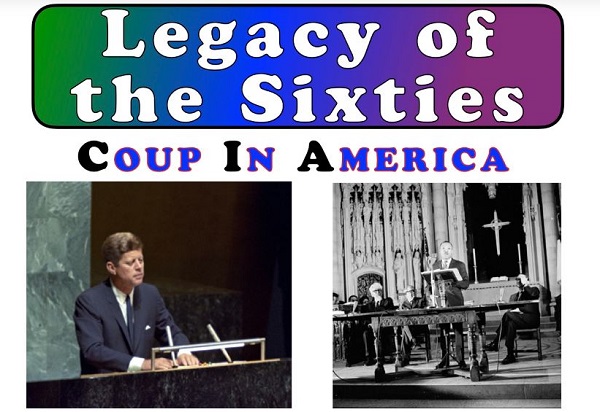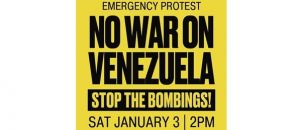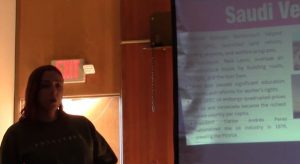Mark Robinowitz: Why we need truth and reconciliation
12 min read
Mark Robinowitz: My name’s Mark Robinowitz. ‘Truth and reconciliation‘ is the name of a different approach to politics and justice and understanding that was pioneered 30 years ago in South Africa after the end of apartheid.
[00:00:16] Nelson Mandela, the first majority president and some of his associates were concerned that the country was in a very dangerous place, sort of a civil war, that could have destroyed what was left of the country.
[00:00:33] So the new government created the Truth and Reconciliation Commission, which was chaired by Reverend Desmond Tutu, Nobel Peace Prize laureate. And they held hearings for (I think) a couple years, and they invited people who had committed crimes motivated by politics, police officers and other agents of the apartheid state, and also some people on the liberation force side as well, who had committed atrocities for their political views.
[00:01:09] Perpetrators were offered amnesty for their crimes, including murder, if they admitted the crimes in public. And it was essential for breaking some of the denial on the white side about what had been done in their name. Also, some of the denial on the Black side for what had been done in their names as well.
[00:01:29] It was not universally popular. The liberation activist Steve Biko, who was beaten to death by police officers in a prison, his widow did not approve of truth and reconciliation. Steve Biko’s killers admitted what they did and they got amnesty for their crimes and never served any time in prison. And they did not even have to apologize for what they had done.
[00:01:56] Perhaps a bigger oversight is reparations were not included. So post-apartheid South Africa did not substantially change disparate land ownership and other forms of wealth in their society. And South Africa today has countless problems, so it was not a complete success.
[00:02:21] But what would have been perfect? That’s hard to say. And there’s some positive lessons and some negative lessons that we can draw here in the United States for truth and reconciliation.
[00:02:33] But before getting into that, it’s worth mentioning that truth and reconciliation has been adopted, I think, in a couple dozen societies since the mid-‘90s to deal with other forms of impunity and police abuse and state sponsored violence, and they all have their different qualities.
[00:02:57] One that I’ve read about recently was in the West African country of The Gambia. They had a Truth and Reconciliation and Reparations Commission after they finally toppled their dictator, who’d been in office over 20 years. And the media coverage of this mentioned that during the hearings, when victims of official violence and torture gave testimony in public, it was broadcast on the national radio and the country ground to a halt, as everybody in their society listened intently to what was coming out.
[00:03:34] No system of accountability could be perfect, but giving victims the ability to communicate directly to their people might be a deterrent against a repeat. ‘Might’ is the operative word.
[00:03:50] So in the United States, the most obvious place to start is with the theft of Indigenous lands that led to the creation of the United States. And this is a long, painful history far beyond the ability of this conversation to summarize. It’s worth noting that of the hundreds of treaties that the United States signed with the different Indigenous peoples of the land, to my knowledge, not a single one was ever honored.
[00:04:22] We also have the parallel situation of the legacy of African slavery in the United States, which, despite being formally abolished in the 1800s, we are still dealing with countless reverberations from that legacy to this day in terms of disproportionate power and wealth and intergenerational trauma and all the rest.
[00:04:50] In recent years, perhaps the most positive and practical application of truth and reconciliation was by the family of Martin Luther King Jr., who was assassinated April 4, 1968. And after a number of years, the family, recovered slightly from the shock of their loved one’s assassination, came to suspect the official story—that James Earl Ray was not actually the shooter of Martin.
[00:05:26] They worked with an attorney who had been friends with King, and realized that the inconsistencies and the official story didn’t match up with what was plausible and physically possible.
[00:05:42] Dexter King, one of King’s sons, actually met with Ray in his prison cell toward the end of Ray’s life and became convinced that he was telling the truth, that he didn’t do the crime. Ray was not a pleasant person. He was a small-time criminal, but he did not have the physical ability to do what he was accused of doing.
[00:06:06] After Ray’s death, the King family filed suit in Memphis to look into what was actually done with the murder, and they only requested $100 from a jury verdict because they weren’t trying to profiteer. They just wanted the truth to come out.
[00:06:24] And there was about 2,700 pages of testimony over three weeks, and it’s pretty clear that the federal government, or elements thereof, were involved in removing Martin Luther King from politics.
[00:06:40] And this was done, not just because he was standing up to racism—King had gotten plenty of death threats from racists due to that—but because King, toward the end of his life, connected the dots between what he called the triple evils of racism, militarism, and economic injustice.
[00:07:01] Most notably, exactly a year before, April 4, 1967, his ‘Beyond Vietnam’ speech at Riverside Church in New York City. That’s what signed King’s death warrant, according to his friend, Rabbi Heschel, who was in attendance at the Riverside Church speech.
[00:07:24] It’s worth remembering also that King was intensely unpopular at the time of his martyrdom. That most of the major media in the U.S. were in opposition to him and his denunciation of the U.S. in Vietnam fueled an intense backlash by the political system. He was never invited again to the White House after speaking out against the war in Vietnam and for him to now be seen as a great American statesman with a holiday named in his honor is really quite a shift in our memory of his life.
[00:08:06] In 2018, members of the King family, the Kennedy family, and relatives of Malcolm X joined together with a number of their former aides and allies to create the Truth and Reconciliation Group to petition Congress to reopen the investigations into those four assassinations, Martin Luther King, John Kennedy, Robert Kennedy, and Malcolm X, since there are, to put it mildly, major inconsistencies with the official stories in each of those assassinations.
[00:08:48] And each of those four leaders of American politics were assassinated for similar reasons. They were threats to the dominant paradigm of war and economic injustice, not just because of racism.
[00:09:05] And part of what makes American politics dysfunctional is, a majority of people in the United States suspect, at least with the President Kennedy assassination and to lesser extent the others, that there are problems with the narrative that we have been told. And the gap between widespread suspicion and the official coverups leads to a lot of distrust.
[00:09:35] Some of that distrust is unhealthy and has poisoned practical politics in the United States. Unfortunately, mere distrust is not enough because it’s easy to be suspicious. But a lot of what passes for conspiracy claims is also often incorrect and it is harmless to the system for people to believe a mix of truth and nonsense as long as it doesn’t lead anywhere. And unfortunately, also, the truth and reconciliation efforts from 2018 didn’t lead Congress to do anything about it. And it’s almost entirely forgotten as an initiative since then.
[00:10:22] Most notably, two of the key members of the Kennedy family actually signed on to this (even though in private they all understand it): Robert Kennedy Jr. and also Kathleen Kennedy Townsend, who was formerly the lieutenant governor of Maryland. They both signed on to this.
[00:10:42] Robert Kennedy Jr. is a very interesting character in these discussions. He was actually told by his father, Robert Kennedy, that the CIA had in fact assassinated his uncle, President Kennedy, and he knew this growing up as a child. As a young adult, he was addicted to heroin, which is a sign of trauma in most cases, and it wasn’t until 2013 that he actually went public with his private understanding that it was an act of state, the assassination of his uncle.
[00:11:22] He’s even met with Sirhan Sirhan, at his prison cell more recently, and is of the view that there was a second gunman who actually fired the fatal shots.
[00:11:36] That’s also the view of the former coroner of Los Angeles, who noted that Sen. Robert Kennedy had powder burns on his body that could have only come from point-blank firing. And Sirhan was firing a gun, but he never got close enough to do that. And there were over 70 people in the room that saw this happen. And there were also too many bullets fired and recovered to have all fit in Sirhan’s gun.
[00:12:05] Unfortunately, again, Robert Kennedy Jr. has some discrediting other views that make it very difficult for most people to accept what he is saying about the assassinations of the ‘60s. Notably, his embrace of very right-wing untruthful hoaxes about medicine and vaccines and COVID. He is the loudest anti-vaxxer in the world. He denies that polio virus causes polio disease. He denies that HIV causes AIDS. And his presidential campaign, the biggest funder of it currently is the billionaire Timothy Mellon of the Mellon financial dynasty, who’s given him $25 million, at the same time giving a comparable amount to the Trump 2024 campaign.
[00:13:04] But the fact that he is truthful about the assassinations of the ‘60s gets in the way of convincing most people that this is a real concern.
[00:13:16] Now, unfortunately, it’s long past the time for legal accountability. The perpetrators of those crimes are long gone, but the coverup continues. Part of the promise of truth and reconciliation is to deal with these gigantic traumas in ways to avoid political bickering and retribution, because part of the problem is our whole society has gone along with these things, whether you’re talking about theft of Indigenous land or the legacy of slavery or the war in Vietnam, the assassination of the president, and countless other problems.
[00:14:02] We’ve tried mere retribution and there might be a place for that. But often it just results in the bitterness being perpetrated further. We haven’t tried an approach where we recognize these crimes have been done in our name, and to various extent, we have tolerated them and gone along with them.
[00:14:28] There was a congressional investigator named Gaeton Fonzi, who was part of the Select Committee on Assassinations during the late 1970s, during the Carter administration. He said later in his life that we know what happened with the Kennedy assassinations. We just don’t know all of the details.
[00:14:52] You can, if you want, delve into the microanalysis of every claim and counterclaim of what happened in Dallas, but that’s not really very productive. What matters more is the reason that President Kennedy was extrajudicially removed from office. He had stood up to the generals and the CIA during the Cuban Missile Crisis and defused a nuclear war situation between himself and Khrushchev of the Soviet Union.
[00:15:33] I have an archive of a presentation I gave on truth and reconciliation for the National Insecurity State, back in 2018 on a conference on the 50th anniversary of the Martin Luther King and Robert Kennedy assassinations, and that is at JFKMLKRFK.com.
[00:16:01] There is a left critique to make of President Kennedy, but what matters more is what the generals and the spies thought and what they did about it. And at some level, we all somewhat know this and we’ve tolerated this in our society. We’ve allowed it to become a comedic approach. We’ve allowed it to become wild speculation, sort of a parlor game of entertainment.
[00:16:33] But this just gets in the way of realizing that unchecked militarism is destroying the world. And this is a huge part of it. This goes far beyond this—the United States involvement in Vietnam and Central America and Iraq and many other scandals, plus the never-ending preparation for nuclear war.
[00:16:59] These are all obstacles to using our talents and resources to make a world where we meet human needs and repair the damage we’ve all done to the natural world on Spaceship Earth. Because if we destroy the environment, there are no other planets, and we all know that. But this is not something that the political system can really engage with.
[00:17:23] So we have to recognize truth and reconciliation can also be fractal. It applies to conflicts between governments, but it can scale down to conflicts within a smaller community. And at the individual level, we have to realize our own efforts at self-censorship and denial that get in the way of understanding our responsibility, and shifts away from polarization and radicalization toward recognizing that we’re all in the same world.
[00:18:01] The distance between one end of Eugene-Springfield to the other is the breathable thickness of the atmosphere. And we all have to figure out how we’re going to cooperate and survive on this thin film of the biosphere that is the only place where we can exist.
[00:18:18] In a final mention, I’ve done a lot of looking into what could be done with truth and reconciliation for the conflict between Israel and Palestine. This is an enormous topic, but there’s also a lot of potentials. Perhaps the biggest one is for both sides in that conflict to realize that neither side is innocent, that both have committed atrocities that need to be acknowledged.
[00:18:47] And both sides are stuck living with each other as neighbors, whether it’s the two-state solution or one-state solution or some other variation on either, they’re going to be neighbors, and they’re cousins, literally. This does not negate the power imbalance, where Israel is a nuclear-armed country, and Palestine, their violence is from guerrilla forces for the most part, but they’re going to have to see each other as inseparable.
[00:19:21] There are groups in both societies that have been trying to build bridges for decades, and this is a much more difficult problem, especially in the last year with the destruction of Gaza. But, if that were to end at some point, they’re still going to be stuck living with each other, even if Gaza’s turned into rubble.
[00:19:44] There’s an Israeli I heard recently who said that you can look at the relations between Germany and Israel. They were notoriously as bad as they could possibly be with the Holocaust, but with the passage of time, Germany and Israel now have very good relations. And what the grandparents of the current generation in Germany did to the Jewish people of Europe, that’s taught in all the schools, the government officially acknowledges it, and apologizes for it, and makes some reparations for it.
[00:20:21] How well that could apply to Israel-Palestine is an unanswerable question, but it’s a place to start. And the intergenerational trauma: Breaking that is at the core, so that, yes, what has been done to Gaza is an atrocity and is genocidal, but someday, hopefully, it can be stopped. And it won’t undo the damage that’s been done, but we can not continue to do it.
[00:20:54] And the Israeli side is traumatized from all sorts of attacks on its side. And this is not about justifying or not justifying 1948 and the Nakba or the 1967 war or any other conflict. These are all historical facts, but they can’t be undone at this point, and we have to realize we have to figure out how to share the world together. And as someone who does not live there, I don’t really particularly care how borders are drawn or structures of various states, as long as the people there consent to it.
[00:21:35] So this is a very brief introduction to how a Truth and Reconciliation approach could be used for a current conflict. And the United States could use its tremendous power if we wanted and if there was enough pressure to pressure both sides to stop with the violent approach to trying to dominate each other so that they can share the world, or their part of the world, and not provide the pretext for endless war that could erupt in a nuclear conflict.







